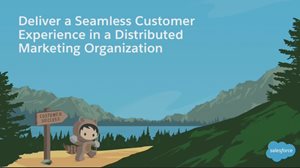"Cloud Wars" Become More Fierce on a Global Scale
As the number of enterprises that leverage the power of cloud computing is on the rise, the  "Cloud Wars" between Amazon, Oracle, Salesforce, Microsoft, and Alibaba is becoming fiercer around the globe. In fact, the cloud Enterprise Content Management (ECM) market size is expected to grow from USD 9.77 Billion in 2017 to USD 34.42 Billion by 2022, at a Compound Annual Growth Rate (CAGR) of 28.6%, reports MarketsandMarkets. Placing, at least, in the top three is one of the biggest parameters of success among cloud-based technology providers.
"Cloud Wars" between Amazon, Oracle, Salesforce, Microsoft, and Alibaba is becoming fiercer around the globe. In fact, the cloud Enterprise Content Management (ECM) market size is expected to grow from USD 9.77 Billion in 2017 to USD 34.42 Billion by 2022, at a Compound Annual Growth Rate (CAGR) of 28.6%, reports MarketsandMarkets. Placing, at least, in the top three is one of the biggest parameters of success among cloud-based technology providers.
Since every move they take shapes the cloud computing world, for us, as users, it is important to stay on top of current events and the latest news. To that end, I have compiled the latest news to give our audience a glimpse into what the top cloud-based technology providers have recently been up to:
Will Oracle Meet Wall Street’s Expectations for Cloud Sales?
In March 2017, Oracle CTO Larry Ellison, who is very well-known for his stark statements and  for provoking his rivals, took on Amazon and Microsoft, saying that Oracle now has “a huge technology lead” over Amazon Web Services and Microsoft’s Azure cloud computing service. He also claimed: “Some of our largest customers' are negotiating huge infrastructure as a service contracts to move all their databases to the Oracle cloud. You can expect some of those big deals to be announced in the coming weeks.” All these statements must have impressed Oracle’s investors as right after that, its shares surged 5.34%.
for provoking his rivals, took on Amazon and Microsoft, saying that Oracle now has “a huge technology lead” over Amazon Web Services and Microsoft’s Azure cloud computing service. He also claimed: “Some of our largest customers' are negotiating huge infrastructure as a service contracts to move all their databases to the Oracle cloud. You can expect some of those big deals to be announced in the coming weeks.” All these statements must have impressed Oracle’s investors as right after that, its shares surged 5.34%.
Fast forwarding to last week, posted very positive quarterly Q2 figures with a 44% year-on-year rise in cloud revenue to hit $1.5 billion in the second quarter, topping Oracle’s own forecast cloud growth of between 39% and 43%. Ahead of the announcement of the figures, the Oracle share price fell the most in three months despite an overall positive and strong set of numbers. The main reason behind this steep fallout was that some analyst had projected stronger growth in Oracle’s cloud sales, with his estimate of $1.55 billion.
Oracle is playing catch up in the newer cloud market that is dominated by Amazon.com Inc. and Microsoft Corp. Given the Redwood City, California-based company has been dominating the database business for 40 years, the vendor is aiming to provide the most robust end-to-end solution in the cloud. According to Ellison, Oracle is the only company that could achieve that. To back himself up, he points out the fact that Amazon doesn’t have the technological and real-world expertise in database which Oracle has developed in 40 years.
In the meantime, Amazon has been revamping its offering through new capabilities to poach Oracle’s traditional database customers. In fact, according to a survey conducted by Morgan Stanley in November revealed that half of 84 Oracle database customers have already moved one of their Oracle databases to another vendor. About 75% of them claimed they have plans to move more of their Oracle databases to another vendor, and 71% said they plan to choose a database vendor other than Oracle for much of their future database needs.
Additionally, when it comes to the cloud war, Patrick Walravens, an analyst at JMP Securities commented on Oracle’s relatively later entry into cloud-based business: “They’re late to that whole cloud battle. A lot of people already have a solution they are happy with. The question is what does Oracle bring to the table?”
Larry Ellison has a plan! Ellison said that Oracle's latest and greatest database, announced in October, will be available in January. Called as the "autonomous" database, it is powered by machine learning which enables the database to detect and solve security issues on its own as well as to adjust its performance if needed. Oracle promises that its new database will cost less than Amazon's competing database, Redshift.
“The first big move of Oracle customers databases to the cloud really will begin in January.  There’s been no big migration anyplace of Oracle databases into anyone’s cloud, including ours. There’s been some, but it’s a relatively very, very small business. This all begins to happen starting in January, where the capabilities of cloud are so much better. The economics in the cloud are so much better than what’s available on premise, that we think our customers are going to move very, very rapidly to the cloud. But they are waiting for our Autonomous Database,” said Larry Ellison.
There’s been no big migration anyplace of Oracle databases into anyone’s cloud, including ours. There’s been some, but it’s a relatively very, very small business. This all begins to happen starting in January, where the capabilities of cloud are so much better. The economics in the cloud are so much better than what’s available on premise, that we think our customers are going to move very, very rapidly to the cloud. But they are waiting for our Autonomous Database,” said Larry Ellison.
In the case of Salesforce, "They’re the only ones that have a larger SaaS business than us," Ellison commented. "They’re the last guy in front of us, but we’re growing more than twice as fast as they are." He also outlined the shortcomings of its rival by saying: “Their main problem is they don’t have an ERP product—they’re not playing in most of the market. They have nothing in Manufacturing, nothing in Supply Chain, nothing in ERP, nothing in HCM."
I agree that Oracle waded into the rapidly growing cloud market a bit later than it should have. That being sad, the vendor is striving aggressively to pick up the speed. To that point, on July 28, 2016, Oracle announced that it had entered into a definitive agreement to acquire SaaS ERP provider NetSuite. At $9.3 billion, the deal is the largest SaaS acquisition to date.
Adding Netsuite to the fray is helping Oracle not only play catch up with its rivals but also gain some additional competitive edge in taking on their rivals as NetSuite enables Oracle to reach out to smaller sized companies than its traditional clientele. If by the next quarter, the vendor will have fully completed the integration with NetSuite and in January, as Ellison claims, the customer flock to the Autonomous Database happens, the next quarterly numbers may surge to the point where they meet Wall Street’s expectations for the cloud cash.
Salesforce Joins the Cloud Native Computing Foundation & Enables Local Marketers
Earlier this year, AWS, Oracle, Microsoft, VMware and Pivotal joined the Cloud Native Computing Foundation (CNCF), the open-source organization that manages Kubernetes, the popular open-source container orchestration tool. Last week, Salesforce followed suit.
Salesforce, much like the other large software companies that have joined the CNCF, wants to benefit from being a part of the process and helping to influence the development of key tools moving forward as containerization provides a way to more tightly control the development process.
“We’re thrilled to be supporting the foundation that underlies much of our next generation infrastructure. The CNCF technologies are an exciting addition to our distributed systems architecture. We look forward to contributing to these technologies and participating in the community,” said Randy Kern, Salesforce EVP of Infrastructure.
In other news, according to the 2016 State of the Connected Customer Report, 75% of consumers say they expect a consistent experience wherever they engage with a company, via website, social media, mobile, in-person, email, and more. To help enterprises meet this expectation, Salesforce launched a new Distributed Marketing tool. With this new addition, businesses will be able to:
-
Create and deploy best-practice consumer journeys to advisors, owners, and partners  using Journey Builder which is Marketing Cloud’s journey management tool.
using Journey Builder which is Marketing Cloud’s journey management tool.
-
Collaborate with advisors, owners, or partners through Sales Cloud, Service Cloud, Financial Services Cloud, or Community Cloud, and connects the journey to the Salesforce campaign.
-
Advisors, owners, and partners can edit each message that will be sent to individual contacts within the journey
-
All of that engagement data is then pushed back into Marketing Cloud at the aggregate, journey level.
Salesforce said Distributed Marketing is available as Salesforce Lightning components in Sales Cloud, Service Cloud or Community Cloud in limited pilot, but the general availability is starting in February 2018.
"While the corporate office delivers on-brand marketing campaigns, it often fails at scaling to the 'last mile' of personal engagement that only local partners can deliver on because they directly manage the consumer relationship," said Joanna Milliken, SVP of product management for Salesforce Marketing Cloud. "In addition, local partners often struggle to access and create corporate-approved marketing materials. This leads to disconnected experiences, and consumers feel as though two different companies are engaging with them."
Microsoft Launches its Azure Stack in India
Started in 2015, Microsoft billed itself as the first global public cloud provider to offer local cloud services in India. 70 of the top 100 Bombay Stock Exchange (BSE) listed companies are now using Microsoft cloud. 10 of the 12 largest banks, including State Bank of India, HDFC Bank, ICICI Bank, Kotak Bank, Yes Bank, Axis Bank, Bank of Baroda, IndusInd Bank, in India use Microsoft Cloud solutions. Speaking of the financial sector, BankChain, a blockchain consortium of 30 banks, runs exclusively on Microsoft Azure blockchain platform. Globally, Microsoft has 64,000 partners and Microsoft India has already more than 9,000 cloud partners.
"We are fuelling innovation and accelerating India's digital transformation with our global and  local cloud services. As many mobile-only and cloud-only collaboration and productivity scenarios emerge in the workplace, we are working with our customers and partners to accelerate movement to the intelligent cloud and intelligent edge in the next year, and to help build new engines of growth. Microsoft and our partners are helping customers who want to utilize the full power of our cloud platform and use artificial intelligence, machine learning, cognitive intelligence and Internet of Things (IoT)," said Microsoft India, President, Anant Maheshwari, in a statement.
local cloud services. As many mobile-only and cloud-only collaboration and productivity scenarios emerge in the workplace, we are working with our customers and partners to accelerate movement to the intelligent cloud and intelligent edge in the next year, and to help build new engines of growth. Microsoft and our partners are helping customers who want to utilize the full power of our cloud platform and use artificial intelligence, machine learning, cognitive intelligence and Internet of Things (IoT)," said Microsoft India, President, Anant Maheshwari, in a statement.
Last week, Microsoft launched its Azure Stack in India. Microsoft Azure Stack is a hybrid cloud platform that offers a wide range of Azure services for on private, on-premises hardware. Microsoft has three of its 42 global data centers regions located in India at Mumbai, Pune and Chennai.
Alibaba Cloud’s First Data Center in India
Alibaba Cloud, the cloud computing arm of Alibaba Group, has made its debut in the Indian market in evidence of its global focus. Its customers can start to sign up for services to be delivered in its new India data center located in Mumbai which is set to open in January 2018. The primary drive behind the data center launch in India is the emerging demand for cloud computing services among Indian small and medium businesses.
Simon Hu, Senior Vice President of Alibaba Group and President of Alibaba Cloud said, “We are excited to be officially opening our new Mumbai, India data centre in early 2018, enabling us to work closely with more Indian enterprises. These local enterprises are innovative and operating in growth sectors, and we look forward to empowering them through our cloud computing and data technologies. As we build out the Alibaba Cloud network globally, India is another important piece that is now firmly in place. This continues our commitment to India, helping it to develop trade opportunities with other markets in the region and beyond.”
excited to be officially opening our new Mumbai, India data centre in early 2018, enabling us to work closely with more Indian enterprises. These local enterprises are innovative and operating in growth sectors, and we look forward to empowering them through our cloud computing and data technologies. As we build out the Alibaba Cloud network globally, India is another important piece that is now firmly in place. This continues our commitment to India, helping it to develop trade opportunities with other markets in the region and beyond.”
Alibaba has been disrupting the cloud space, where Microsoft Azure and Google Cloud Platform have begun gaining ground on dominant leadership Amazon. Gartner’s research shows Amazon holds a 44 percent share of the overall cloud IaaS market, followed by Microsoft at 7 percent, Alibaba, 3 percent and Google trailing at 2 percent today. Alibaba Cloud hit net sales of RMB 3 billion ($447 million) in the most recent quarter, up from RMB 2.4 billion in the previous three-month period.
With the new center, Alibaba Cloud now has 33 availability zones across 16 economic centers globally, including China, Hong Kong, Singapore, Japan, Australia, the Middle East, Europe, India and the U.S. (East and West Coast). India is a key market in Alibaba Cloud’s globalization strategy.

Venus Tamturk
Venus is the Media Reporter for CMS-Connected, with one of her tasks to write thorough articles by creating the most up-to-date and engaging content using B2B digital marketing. She enjoys increasing brand equity and conversion through the strategic use of social media channels and integrated media marketing plans.